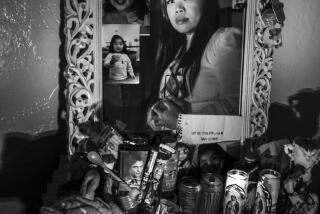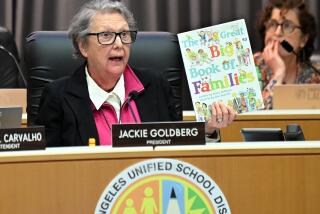Students Rally to Save Support Group
The deep scars on Elizabeth Garcia’s arms and wrists reveal her young life’s desperate periods.
They’re from the numerous times the Garfield High School student, with a world of personal problems crushing her, “carved” herself in attempts to commit suicide.
Garcia, now a 17-year-old senior, says she got through the dark times by leaning on school peers with similar problems in a counseling group instituted by one of the school’s psychologists, Richard Selby.
For 16 years, Focus has been a tightknit group of students that welcomes teenagers who have been abused, attempted suicide, or have a host of other problems.
But recently, the students learned that the program might be eliminated. They held morning protests through the week, culminating Friday with about 40 students and a couple of parents marching in front of the school.
“I started finding out in this group it wasn’t just me lost in the world,” said Garcia, one of the leaders of the protest.
The program was cut from this year’s regular budget by Garfield Principal Norma Danyo--which she said she did in light of budget cuts throughout the state and particularly Los Angeles.
Danyo said Friday afternoon that the program might be funded starting Monday from another source, the school’s Shared Decision-Making Council, a panel composed of Danyo, teachers and parents.
“It is a very worthwhile service the students are being provided,” she said.
But the program should be funded by the school’s budget, said Alberto Palacios, a social studies teacher, co-chairman of the Shared Decision-Making Council and representative of United Teachers-Los Angeles. He said that using the council’s budget, which is made up of public funds, could take money away from other worthy programs.
Most of the $41,000 funding of the program goes toward Selby’s pay. Selby said that it’s part of his normal salary and that the funds simply allow the school to hire another psychologist to perform his other duties when he’s running Focus.
Selby said the peer group is crucial in helping some students deal with personal problems so they can succeed academically.
Selby conceived the program when he noticed that some students had to balance deep problems with their academic work. Poor academic performance is often tied to some serious problem, he said.
His wall in the room where Focus has gathered is full of students’ pictures. Some have been raped, some beaten by parents; some are gay.
There’s the 17-year-old girl who was struggling with her sexuality. There was no one to talk to at home. Her sisters would tell her it didn’t bother them, but they would snicker behind her back.
“They would say ‘What if she likes us,’ ” the girl said. “I had to live like that.”
There’s another 17-year-old girl, whose father beat her and her mother.
“Then I had to come to school and deal with school things,” she said.
The group meets every Tuesday. About 200 students participate each year, Selby says. Parents sign a permission slip.
The strength of the group, says Selby, is that the teenagers themselves act as counselors to new members. Share, listen and be a friend is all that’s required.
“We all talk among each other and realize we are not the only ones with problems,” said John Quintero, whose mother died of cancer. He now lives in foster care. “It makes us feel good because we know we’re helping someone else, too.”
Quintero also helped lead Friday’s rally.
The students marched in front of the school holding signs that read “Help Save Our Focus Group” and chanting “Bring out the principal.”
Rose Garcia, mother of Elizabeth, couldn’t walk because she was on crutches, so she sat on a chair and held up a sign.
“The group has helped her so much that she’s a new person,” the mother said. “A lot of kids have a lot of problems that they wish they could tell somebody about. And if they want to cry, they let them cry all they want in there.”
About half an hour after classes started, administrators asked the students to return to class.
Quintero stopped the march. “We made our point,” he told the protesters. “It’s time to go to class.”
More to Read
Sign up for Essential California
The most important California stories and recommendations in your inbox every morning.
You may occasionally receive promotional content from the Los Angeles Times.










